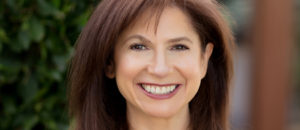 FOR RABBI NAOMI LEVY, it all began with a quotation. She was teaching a class about “oneness” at Nashuva, the spiritual community she’d founded in Los Angeles, when she stumbled upon something Albert Einstein had once said that seemed perfect for her class:
FOR RABBI NAOMI LEVY, it all began with a quotation. She was teaching a class about “oneness” at Nashuva, the spiritual community she’d founded in Los Angeles, when she stumbled upon something Albert Einstein had once said that seemed perfect for her class:
“A human being is a part of the whole, called by us ‘Universe,’ a part limited in time and space. He experiences himself, his thoughts and feelings as something separated from the rest — a kind of optical delusion of his consciousness. The striving to free oneself from this delusion is the one issue of true religion. Not to nourish the delusion but to try to overcome it is the way to reach the attainable measure of peace of mind.”
The quotation resonated with Levy, and she knew she needed to find out more about it. “I came upon that quote by Einstein and it just completely stopped me in my tracks,” said Levy on a recent phone call. “I thought it was so powerful, and it so captured everything that I’d come to believe about our place in this world.” But where had it come from? Under what circumstances had Einstein said it? That search for answers would lead her on a four year journey that resulted in the creation of her newest book “Einstein and the Rabbi: Searching for the Soul,” which she’ll be discussing this month at the Jewish Federation’s 19th annual Jewish Book Festival.
With a little digging, Levy quickly found out that the quotation came from a letter to a Mr. Robert S. Marcus. A little more digging revealed that Marcus was actually Rabbi Robert Marcus, and that the letter was written after Marcus wrote to Einstein about the loss of his young son to polio. The discovery puzzled and amazed Levy. Here was a Rabbi, a grieving father, seeking answers, and “he doesn’t turn to a Rabbi, he doesn’t turn to a therapist, he turns to a physicist to help him understand and make sense of this tragedy.”
As Levy dug into Rabbi Marcus’ background, she discovered a courageous, daring clergyman whose story had not gotten the attention it deserved. Rabbi Marcus served as a chaplain during the second World War, a position for which he volunteered despite having young children. He spent most of the war with troops, “dealing with fear, dealing with terror. Dealing with young boys dying in his arms,” according to Levy. At the end of the war, he helped liberate Buchenwald, and took it upon himself to help the children of the camp. Among those children was a young man named Elie Wiesel.
Levy knew she had to get Wiesel to speak about Marcus for her book. “I was persistent. I kept calling and writing, and calling and writing for about three years,” said Levy, who finally landed the interview. “The distance between us and Rabbi Marcus is Elie Wiesel.”
It wasn’t just Marcus’ work during the war that inspired Levy though. “He was fearless in criticizing the US in it’s treatment of Jews in DP camps. Fearless in opening his mouth. He opened his mouth and criticized the president, he criticized the US Army, he criticized the Brits, he was a fearless man and he dedicated the latter part of young life to fighting for international causes,” said Levy. “The causes of stateless people, the causes of refugees — these are causes that are still alive right now and he dedicated his life to them.”
That Marcus, who helped save so many children during the war, lost his own son to polio, is a sadly ironic fact that’s not lost on Levy. She had to confront her own mortality during the time she was writing the book, when she was diagnosed with cancer and had to undergo surgery that required the reconstruction of much of her face. “I was shaken, and in the experience of being shaken I started to feel like an imposter,” said Levy. Had her work as a Rabbi been for nothing, she wondered? “I think I forgot who I was.”
Revealing Rabbi Marcus’ story, and bringing it to light, helped Levy discover her own purpose in life again. “The biggest mitzvah for me… was what I’ve been able to do for his daughter. What it means to his daughter to have her father and his heroism, and his crisis, revealed to the people.”
The responses Levy’s received to the book have also heartened her. “One woman wrote to me recently and said, I feel like my whole life I’ve been living it in 2D and you opened up a door and now I’m seeing it in 3D,” said Levy.
As for what she’s learned from Rabbi Marcus, Levy hopes that his courage has rubbed off on her. “I’d like to believe… that in a time of crisis, that I’d be willing to put myself in harm’s way for the sake of others,” said Levy. “This book and these stories have become fixtures in my life.”
She hopes her own journey will help readers take a journey of their own. “I’m hoping people come away from this book with a new knowledge of their connection to everything in this world. That they’re not separate, that they’re not alone, that we need to care for each other, and that caring for anybody else is actually the deepest act of self-help that you can do.”
Rabbi Naomi Levy will be speaking about her book at Temple Sinai of Glendale on Sunday, November 19, at 4:00 PM.
For details and to make reservations, go to www.jewishsgpv.org or call the Jewish Federation office at (626) 445-0810.
Jonathan Maseng is a contributing writer to Jlife magazine.






